In the swirling vortex of corporate sustainability, a murky undercurrent of greenwashing steadily amplifies, becoming an increasingly prominent issue.
Research by RepRisk, a globally recognised ESG data science company, brings to the surface a revealing link between greenwashing and social washing, particularly amidst publicly listed companies. Their data, accumulated over the past twelve months, indicates that one in every four climate-related ESG risks is intricately tied to greenwashing—a palpable rise from the one in five recorded in the previous year’s report.
A further dive into the data between September 2018 and September 2023 reveals a striking 31% of public companies implicated in greenwashing were also entwined in social washing. Notably, it’s not only a global issue but one that has seen the banking and financial services sectors experience a sharp 70% increase in the number of climate-related greenwashing incidents within the last year alone.
RepRisk CEO and co-founder Philipp Aeby articulated the gravity of the situation. “Investors and other market participants need transparent data on adverse impacts to assess a company’s true business conduct and mitigate green and social washing risk in their portfolios and supply chains,” said Aeby.
The corporate façade of sustainability, birthed from an anticipation of competitive advantage, has too long been permitted to flourish, often due to a pervasive lack of accountability within the ever-evolving domain of corporate sustainability.
While greenwashing—projecting a deceptively environmentally responsible image—takes the limelight, the parallel issue of social washing cannot be disregarded. Social washing emerges when businesses convey misleading portrayals of their social responsibility.
Current research typically orbits around diversity topics; however, according to RepRisk’s findings, both the UK and US report the most prevalent social washing issues to be human rights abuses and corporate complicity. Moreover, 55% of global greenwashing risk incidents embed a social aspect, demonstrating a robust correlation between greenwashing and social washing.
The rise of greenwashing isn’t merely a domestic concern; it has seen a potent surge in Europe and the Americas, especially within banking and financial services sectors. In a specific year-long window, these sectors noted a 70% uptick in climate-related greenwashing incidents.
An astounding 50% of these incidents either cited fossil fuels directly or associated a financial institution with an oil and gas company. Aware of the burgeoning issue, in May 2023, the European Banking Authority utilised RepRisk data to classify misleading communication within the banking sector, charting its upward trajectory within the European Union.
It’s imperative to acknowledge that greenwashing structures have evolved, morphing into a more complex issue that supersedes mere consumer deception. Greenwashing now permeates pledges, certifications, and commitments, with a notable absence of accountability, enabling companies to gain from outlining future aspirations without confronting existing issues with due diligence.
Keep up with all the latest FinTech news here.
Copyright © 2023 FinTech Global











